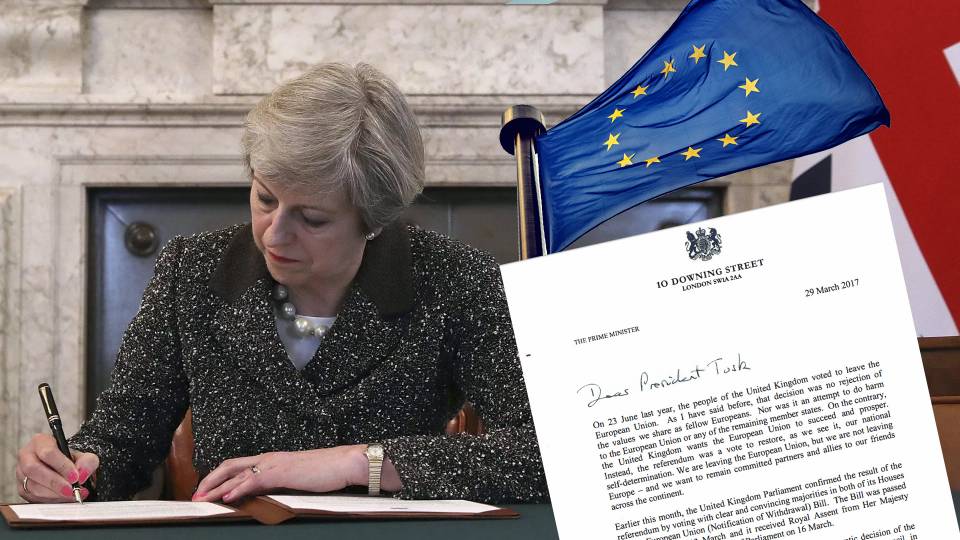'No turning back' on Brexit as Article 50 triggered
Britain's departure from the EU is "an historic moment from which there can be no turning back", Theresa May has said.
She was speaking after Britain's EU ambassador formally triggered the two year exit process by handing a letter to EU Council President Donald Tusk.
A sombre-looking Mr Tusk said it was not a "happy day" for him or the EU.
The European Parliament warned security cooperation was not on the table as it fired its opening salvo in what are expected to be tough negotiations.
In her letter to Mr Tusk triggering Article 50 of the Lisbon Treaty, Mrs May said failure to reach a trade deal within the two-year time limit could "weaken" cooperation in the fight against crime and terrorism.
Read the letter in full (pdf)
But Guy Verhofstadt, the European Parliament's chief Brexit negotiator, said he would not accept any attempt to "bargain" between trade and security, adding: "I think the security of our citizens is far too important to start a trade off from one for the other."
Home Secretary Amber Rudd has said the UK could end intelligence-sharing with Europol, the EU policing agency, if there was no agreement.
But in an interview with the BBC's Andrew Neil, on BBC One, Mrs May said on security that she "would like to be able to maintain the degree of co-operation on these matters that we have currently".
Downing Street insisted Mrs May's comments were not intended as a threat to EU negotiators, saying it was a "simple fact" the existing arrangements would lapse if Britain left the EU without a deal.
But opposition MPs accused her of jeopardising public safety by attempting to use security co-operation as a "bargaining chip" in the forthcoming negotiations.
Article 50 of the Lisbon Treaty gives both sides two years to reach agreement so, unless the UK and the 27 remaining EU member states agree to extend the deadline for talks, the UK will leave on 29 March 2019, a Friday.
At a press conference in Brussels, Donald Tusk held up Mrs May's letter, saying: "We already miss you."
In a brief statement, he said it was not "a happy day" for him or for the EU and promised to begin arrangements for the UK's "orderly withdrawal".
He said the EU's aim in negotiations was "damage limitation" and to "minimise costs" for EU citizens, businesses and member states.
In a statement in the Commons, Mrs May said: "Today the government acts on the democratic will of the British people and it acts too on the clear and convincing position of this House."
She added: "The Article 50 process is now under way and in accordance with the wishes of the British people the United Kingdom is leaving the European Union.
"This is an historic moment from which there can be no turning back."
She said Britain would now make its own decisions and its own laws and "take control of the things that matter most to us - we are going to take this opportunity to build a stronger, fairer Britain, a country that our children and grandchildren are proud to call home".
She told MPs that this marks "the moment for the country to come together".
Mrs May said it was a "moment of celebration for some, disappointment for others" and promised to "represent every person in the whole United Kingdom" during the negotiations - including EU nationals, whose status after Brexit has yet to be settled.
She said that while the UK would remain the "best friend and neighbour" to its EU partners, it would also look beyond the borders of Europe, saying the country can "look forward with optimism and hope and to believe in the enduring power of the British spirit".
"I choose to believe in Britain and that our best days lie ahead."
A six-page letter from Mrs May triggering Article 50 was handed to European Council President Donald Tusk by the UK's ambassador to the EU Sir Tim Barrow.






















